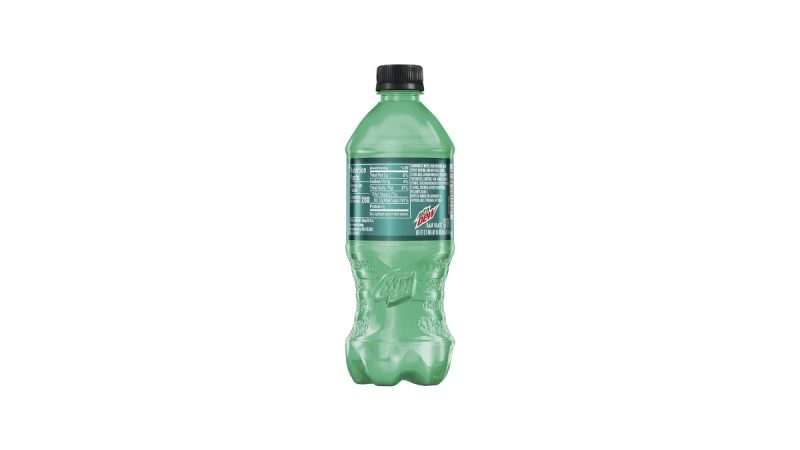Mountain Dew, the vibrant green citrus soda from PepsiCo, is a staple in many diets—but what exactly are you drinking? This article breaks down the nutrition facts for Mountain Dew across serving sizes and flavors, explores key ingredients, examines health effects, and offers practical tips for mindful consumption.
Nutrition Facts: Mountain Dew by Serving Size
12 fl oz (1 Can)
- Calories: ~170 kcal (FatSecret, BevChart)
- Carbohydrates (Total Sugars): 46 g (100% of carbs) (FatSecret, My Food Data)
- Fat / Protein: 0 g
- Sodium: ~60 mg (3% DV) (My Food Data)
- Caffeine: ~54 mg (Nutritionix, Wikipedia)
20 fl oz (Bottle)
- Calories: ~290 kcal (Nutrition & Ingredients)
- Sugars: 77 g (all added sugars) (Nutrition & Ingredients)
- Carbs: 77 g (Nutrition & Ingredients)
- Sodium: ~105 mg (Nutrition & Ingredients)
- Caffeine: ~91 mg (Nutrition & Ingredients)
Per Liter
- Estimated ~400–420 kcal per liter (based on proportional serving sizes) (Medicinecontact.com)
Ingredients Overview
The original Mountain Dew formula in the U.S. typically includes:
- Carbonated Water
- High Fructose Corn Syrup (HFCS) as the primary sweetener
- Concentrated Orange Juice, Citric Acid, Natural Flavors
- Sodium Benzoate, Caffeine, Sodium Citrate
- Gum Arabic, Erythorbic Acid, Calcium Disodium EDTA, Yellow 5 Coloring (Wikipedia)
In some regions, HFCS is replaced with glucose-fructose; brominated vegetable oil, once included, has been discontinued (Wikipedia).
Health Implications
High Sugar & Calories
- A 20 oz bottle contains 77 g of added sugar—over 150% of the daily recommended limit (50 g) (Nutrition & Ingredients, My Food Data).
- These are “empty” calories with zero nutritional benefit.
Blood Sugar Spikes & Weight Gain
- High sugar and lack of fiber/protein cause rapid glycemic impact and potential weight gain (Medicinecontact.com).
Dental Risks
- The acidic nature plus sugar can erode enamel, increasing tooth decay risks (Medicinecontact.com).
Caffeine Effects
- With 91 mg in 20 oz, Mountain Dew packs more caffeine than most sodas and nearly matches coffee strength (Nutrition & Ingredients).
Reformulation & Controversy
- Recently, in regions like Australia, PepsiCo reduced the sugar in Mountain Dew by ~40% and reformulated the recipe with artificial sweeteners (News.com.au).
- Public feedback highlighted concerns over transparency and implications for those dependent on sugar (e.g., diabetics) (News.com.au).
Tips for Mindful Consumption
- Stick to Smaller Portions – A 12 oz can has 170 calories vs. 290 in a 20 oz bottle.
- Opt for Diet / Zero Sugar Versions – Consider Diet Mountain Dew or Zero Sugar options, though taste and sweeteners may differ.
- Alternative Approaches – Dilute with seltzer, pair with water, or limit to occasional treats to reduce sugar intake (Medicinecontact.com).
- Be Caffeine-Conscious – Keep overall daily caffeine consumption under 400 mg.
- Hydrate with Water – Alternate soda with water to mitigate sugar and acid impact.
Summary Table: Nutrition by Serving
| Serving Size | Calories | Total Sugar | Caffeine |
| 12 oz can | 170 kcal | 46 g | 54 mg |
| 20 oz bottle | 290 kcal | 77 g | 91 mg |
| 1 Liter | ~400–420 kcal | ~100–110 g | ~140–150 mg |
Conclusion
Mountain Dew is a high-caffeine, high-sugar soft drink with minimal nutritional benefits. While enjoyable in moderation, it carries significant health risks when consumed frequently. Especially in light of recent recipe changes introduced without clear labeling, staying informed is essential for making healthier beverage choices.
FAQs
1. How many calories are in a can of Mountain Dew?
A standard 12 oz can of Mountain Dew contains about 170 calories, all of which come from sugar. A 20 oz bottle has around 290 calories.
2. How much sugar is in Mountain Dew?
A 12 oz can has 46 grams of sugar, while a 20 oz bottle has a staggering 77 grams, exceeding the recommended daily sugar intake for adults.
3. How much caffeine does Mountain Dew have?
A 12 oz can contains around 54 mg of caffeine, and a 20 oz bottle contains 91 mg, making it one of the most caffeinated sodas on the market.
4. Is Mountain Dew bad for your health?
Regular consumption can increase the risk of weight gain, diabetes, tooth decay, and high blood sugar spikes due to its high sugar content and acidity. Moderation is key.
5. Are there healthier versions of Mountain Dew?
Yes, options like Diet Mountain Dew and Mountain Dew Zero Sugar provide the same flavor without calories or sugar, though they contain artificial sweeteners instead.
Also read: How to Style Your Wedding Car: Unique Decoration Ideas in Singapore









